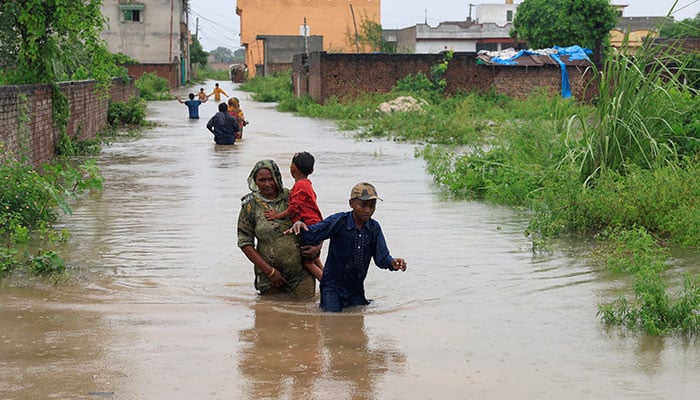Pakistan accuses India of weaponising water as sudden dam discharges from across the border intensified flooding in Punjab, submerging vast areas and displacing thousands of people. Federal Minister for Planning and Development Ahsan Iqbal strongly criticized New Delhi’s move, calling it a deliberate attempt to create a humanitarian crisis.
Torrents from Indian Dams Worsen Flood Situation
Speaking in an interview, Ahsan Iqbal said India has started “using water as a weapon.” He alleged that New Delhi stores water in dams and suddenly releases it without prior notice, worsening floods in downstream areas of Pakistan.
Iqbal termed the latest release the “worst example” of water aggression, stressing that the sudden torrents caused the Ravi, Sutlej, and Chenab rivers to overflow. These rivers have now inundated several districts in Punjab, including Gujranwala, where at least seven people have died.
He also criticized India for failing to provide timely information on the discharges, saying this action endangered lives, property, and agricultural land.
کرتار پور سے زائرین کے انخلاء کے آپریشن کی میں نے خود نگرانی کی اور لمحہ بہ لمحہ صورتحال پر نظر رکھی۔ الحمدللہ تمام محصور زائرین کو بحفاظت نکالنے کا عمل شروع ہو چکا ہے اور انتظامیہ پوری تندہی سے اپنی ذمہ داریاں ادا کر رہی ہے۔ ہمارا اولین مقصد یہ ہے کہ ہر زائر کو مکمل تحفظ اور… pic.twitter.com/vxNEMdZs46
— Ahsan Iqbal (@betterpakistan) August 27, 2025
NDMA Issues Warnings for Sindh
The National Disaster Management Authority (NDMA) has alerted Sindh’s Provincial Disaster Management Authority (PDMA) to prepare for possible flooding along the Indus River. The warning covers vulnerable katcha areas and low-lying belts where communities face a heightened risk of displacement.
Evacuation plans have been initiated, and authorities in Sindh have been advised to relocate residents to safer zones. The NDMA emphasized that coordination between federal and provincial bodies is crucial to minimize casualties.
Maryam Nawaz Orders Strict Relief Measures
Punjab Chief Minister Maryam Nawaz has directed provincial and district administrations to intensify relief operations in flood-hit regions. She ordered commissioners and deputy commissioners to remain in the field and closely monitor the situation.
Maryam instructed officials to document damages to homes and crops immediately and restrict people from entering flood-affected zones. Her directives also include ensuring the rapid distribution of food, shelter, and medical aid to displaced families.
India’s Failure to Cooperate
In a video statement from Kartarpur, Ahsan Iqbal condemned India’s actions, saying, “Some issues are beyond national disputes and political differences. Countries should put aside differences and cooperate on water resources.”
He accused India of turning natural disasters into political tools. “India did not share information with Pakistan in a timely manner. This failure is extremely regrettable and inhumane,” Iqbal said.
The minister highlighted that under the Indus Waters Treaty (IWT), both countries are bound to share real-time water discharge data. However, India has suspended cooperation under the treaty since Prime Minister Narendra Modi’s government put it in abeyance following the Pahalgam attack in Indian Illegally Occupied Jammu and Kashmir (IIOJK) earlier this year.
Arbitration Court’s Ruling
The Permanent Court of Arbitration recently ruled in Pakistan’s favor in a supplemental award under the IWT case. The unanimous decision confirmed that India cannot unilaterally suspend the accord. It also reinforced the jurisdiction of the arbitration court and the Neutral Expert in disputes arising from the treaty.
Despite this ruling, Pakistan accuses India of weaponising water by bypassing established mechanisms. Although India issued warnings through diplomatic channels about possible flooding, it failed to use the bilateral commission as required under the treaty.
Read more: Punjab Issues Fresh Flood Warnings as Water Levels Rise
Humanitarian Concerns Mount
Flooding in Punjab has left hundreds of villages submerged, damaging crops and infrastructure. Thousands of families have been forced to leave their homes, while schools and community centers have been converted into makeshift shelters.
Relief teams from Rescue 1122, the army, and local administrations are providing food, clean water, and medical assistance. However, with continuous inflows from India, the risk of further devastation remains high.
Ahsan Iqbal urged the international community to take notice of what he called India’s “water aggression.” He stressed that weaponising natural resources undermines regional stability and threatens millions of lives in South Asia.
Follow us on Instagram, YouTube, Facebook,, X and TikTok for latest updates
